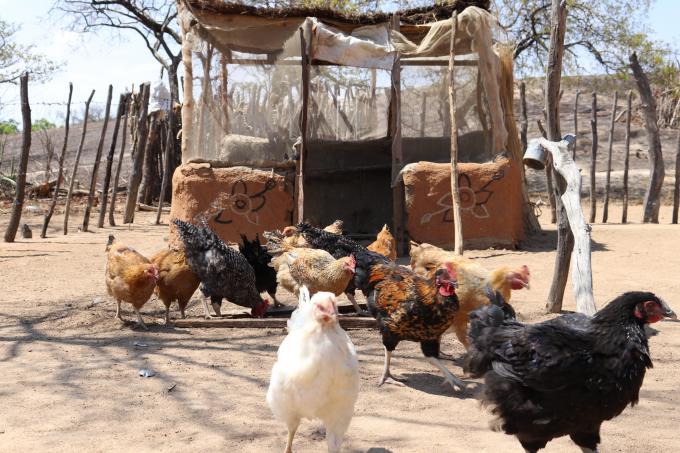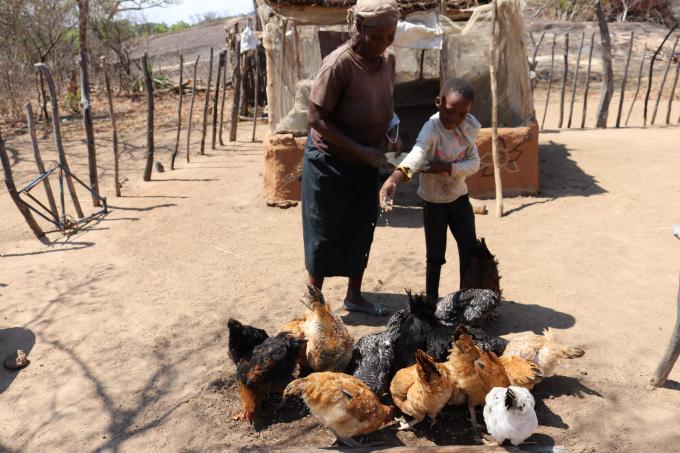Building Secure Livelihoods for Families through Poultry Projects
For Pauline (62) of Phuzamaphiko village in Matobo district, owning chickens was a dream she never imagined coming true.

“I have always wanted to start a chicken project so I sell them and earn some money to take care of my grandchildren but I did not have the resources to start the project,” she recalls.
Pauline (62), lives with her two grandchildren, Ashely (13) and Amanda (8). Her family is one of many rural families in Zimbabwe living below the poverty line. They are largely reliant on agriculture and weaving baskets for sale for their food and income. As a result, in the event of a disaster, her family becomes extremely vulnerable. When Pauline fails to earn enough to make ends meet every day, she is unable to feed her two grandchildren.
The past few years have been challenging for her family. Last farming season, most of her crops wilted due to excessive rainfall. She only managed to harvest two buckets of maize and one bucket of millet. The COVID-19 induced lockdowns and travel restrictions also affected her basket sales as she could not send them to the nearby Bulawayo city where there is a market and this has affected her family.
Thanks to Save the Children’s poultry distribution initiative, Pauline is now a proud poultry owner. She received twenty Sasso chickens- a dual-purpose chicken breed that can be kept for both meat and eggs.
“I am grateful I received 20 chickens and a 50kg bag of poultry feed to start a poultry project here at my home. I feel empowered because it’s something I have always wanted to do.”

“The chickens grow very fast compared to road runners and the breed is easy to rear. I mix millet with the poultry feed for them to eat,” said Pauline.
“Once the chickens have matured, I will sell all the roosters and remain with the hens which will start producing eggs soon. I will use some of the money I get from selling the chickens to settle the school fees debt at my grandchildren’s school and I will use the remaining money to buy more chickens for my poultry project to continue.”
“My future plan is to raise enough money to buy goats for rearing through selling the chickens and eggs. I don’t see my family going hungry even when we fail to harvest much from the fields because we will be able to trade the chickens and get food,” Pauline explained.
Amanda is excited about the chickens
Amanda (8) helps her grandmother to feed the chickens when she comes back from school. She does not want to miss a day without feeding them.

“When we got the chickens I was so happy, I told all my friends at school. I enjoy helping my grandma to feed the chickens.”
“My grandma told me that she will sell the chickens and buy food and books for my sister and I. She also told me that when the chickens start producing eggs, she will cook some for my sister and I to eat at school. I love eating boiled eggs,” Amanda happily said.
Stepping Up for Vulnerable Households
The poultry distribution initiative is part of the European Union funded Stepping-up Post-Emergency Recovery and Resilience to Empower Vulnerable Communities in Zimbabwe (SUPER-EVC) project which is being implemented by Save the Children and ICRISAT in Beitbridge and Matobo districts of Zimbabwe.
17060 chickens and 85.3MT of poultry feed were distributed to 853 households in Matobo district. The project is also supporting husbandry of small ruminants with 661 beneficiaries receiving 1209 goats in the two districts. Smallholder farmers also received drought resistant crop inputs with thrive in dry regions with low rainfall and they were also trained on climate smart farming techniques.
Prior to receiving goats and chickens, communities were trained on goat and poultry rearing and how to construct cost-effective fowl runs and goat pens to protect them from the extremely hot temperatures experienced in the two districts.
Matobo and Beitbridge are in agro-ecological region 4 and 5, which receive low rainfall and experience extremely hot weather conditions, resulting in recurrent food shortages due to crop failures. These negative climate implications have also resulted in the loss livestock. Through this project, Save the children aims to improve resilience of 4500 vulnerable households to cope with and recover from recurrent livelihoods shocks and stresses.
 Zimbabwe
Zimbabwe